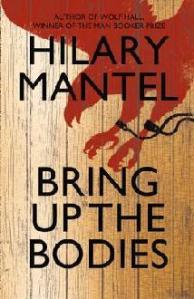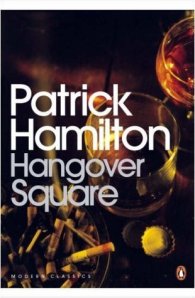 This is a quote-heavy review, because really, the best review I could possibly write would just be to transcribe huge chunks of the prose and roll around in them all day. The thing about novels about Henry VIII is that you know the plot – you come to Wolf Hall and Bring Up the Bodies knowing full well this is not going to be happy ever after for Anne, and it really doesn’t matter. (The endpapers of Anne’s neck in the hardback edition are a nice touch, after all, that’s what it all boils down to!)
This is a quote-heavy review, because really, the best review I could possibly write would just be to transcribe huge chunks of the prose and roll around in them all day. The thing about novels about Henry VIII is that you know the plot – you come to Wolf Hall and Bring Up the Bodies knowing full well this is not going to be happy ever after for Anne, and it really doesn’t matter. (The endpapers of Anne’s neck in the hardback edition are a nice touch, after all, that’s what it all boils down to!)
Where Wolf Hall followed Anne Boleyn’s play for power and the legal and political divorce of Katherine from Henry, Bring Up the Bodies shows Henry’s waning interest in Anne, her increasingly hysterical attempts to keep him, and the rising star of the Seymours. Thomas Cromwell is again the man at the centre of it all – keeping balls rolling, plates in the air, tales spinning, kitchens running – and it is a delight just to be in his presence, to feel his mind working through Mantel’s masterful free indirect narration. The novel is steeped in historical research but wears it so lightly you barely even notice. People swear by saints you don’t recognise and talk about festivals and clothes and places you don’t really understand, but you never feel lost.
Indeed, the prose skips along so vividly and deceptively easily, you don’t realise you’ve found yourself immured in a single-minded plot for revenge until it’s too late. When Cromwell anticipates the King’s desire to be rid of Anne Boleyn, he sees the perfect opportunity to rid himself of those men who mocked the death of his master, Cardinal Wolsey, in Wolf Hall, dressing up as demons and carrying him off to hell. It is so officiously done, so scrupulously enacted, that you can almost miss the fact that you are witnessing the calling in of a debt the debtors had forgotten. What is scary is not only Cromwell’s unflappability in his accusations, nor his bloody mindedness to get at the truth, but also the idea that somewhere, beneath Cromwell’s apparent unruffled feathers and within the games of politics and strategy at court, that you can strike a blow on Cromwell that will not show and to which he will not retaliate, but which he will not forget, and which seven years later will be called to account.
Bring Up the Bodies not only alludes to the phrase used to describe prisoners taken to the Tower of London, but to Cromwell’s own settling of those debts. The bodies he is haunted by – his wife and daughters, Thomas More, Cardinal Wolsey – and how they return in subtle, unexpected ways. Both Henry Norris and Anne recognise that despite the talk of marriage and annulment, adultery and witchcraft, this boils down to payback.
Cromwell says time and again, that once you have set your mind on a course of action, you must follow through without hesitation. And most powerfully, we have the rare glimpse of, not remorse or unease, but acknowledgement that these complex legal machinations boil down to something bloody and murderous.
Let us say you are in a chamber, the windows sealed, you are conscious of the proximity of other bodies, of the declining light. In the room you put cases, you play games, you move your personnel around each other: notional bodies, hard as ivory, black as ebony, pushed on their paths across the squares. Then you say, I can’t endure this any more, I must breathe: you burst out of the room and into a wild garden where the guilty are hanging from trees, no longer ivory, no longer ebony, but flesh; and their wild lamenting tongues proclaim their guilt as they die. In this matter, cause has been preceded by effect. What you dreamed has enacted itself. You reach for a blade but the blood is already shed. The lambs have butchered and eaten themselves. They have brought knives to the table, carved themselves, and picked their own bones clean.
Yet Cromwell does not stop, and shows no regret for his actions. Bring Up the Bodies so vividly encapsulates a world in which subtext is everything, anticipation is key, and where the courtly manners, rituals and titles are underpinned by the ever-present threat of ruin or death. In this, Anne Boleyn is more Cromwell’s equal than he recognizes.
One thing she set out to do, this side of salvation: get Henry and keep him. He has lost him to Jane Seymour, and no court of law will judge her more harshly than she judges herself. Since Henry rode away from her yesterday, she has been an impostor, like a child or a court fool, dressed in the costumes of a queen and now ordered to live in the queen’s rooms. She knows adultery is a sin and treason a crime, but to be on the losing side is a greater fault than these.
[…] He says ‘Anne is dead to herself. We shall have no trouble with her now.’
But with the first steps towards reformation, the changing fortunes of Cromwell’s enemies (and who at court is really a friend?) and the ever-changeable, unpredictable King Henry, we can be pretty sure trouble will show up elsewhere for Mantel’s third book of the trilogy.
Rating: 




In a tweet: ‘Give him a dirty look and he’ll gouge your eye out…But he’ll stand anybody a drink.’



















